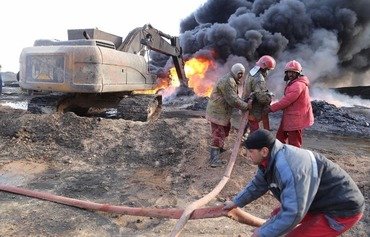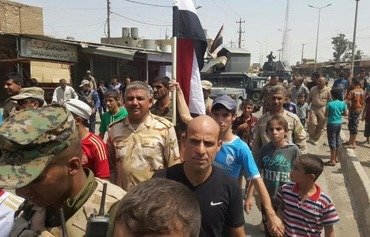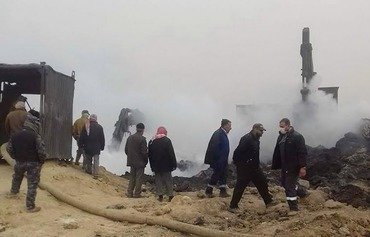Iraqi engineering teams have been working for nearly two weeks to put out fires at six oil wells in al-Qayyara, which the "Islamic State of Iraq and the Levant" (ISIL) set ablaze as liberating forces advanced on the area last month.
Since Iraqi forces regained control of the Ninawa province town on August 23rd, Ministry of Oil engineering teams have been working tirelessly to put out the fires that have clouded the sky with black smoke, Iraqi officials told Diyaruna.
As soon as the last remaining ISIL fighters had been driven from al-Qayyara's oil wells and installations, the ministry moved in to get the fires under control, ministry spokesman Assem Jihad told Diyaruna.
"After securing the area, a specialist engineering and technical team from the North Oil Company headed with its vehicles to the fire sites that consumed several oil fields and covered the sky with black smoke," he said.
Despite perilous working conditions, he said, the team "did the job well, and managed after tremendous efforts to put out six fields that were in flames".
The team also was able to prevent oil leakage into residential neighbourhoods and the spread of flames on a large scale, he added.
ISIL dug up tracts of land in al-Qayyara and poured crude oil into them, he said, forming "what looks like oil swamps" designed to foster the spread of the fires and inflict greater damage.
Fires are still burning in three fields which are located within the area of clashes with ISIL gunmen, he said, adding that ministry teams are on standby and will move in to put them out once these areas have been fully secured.
The ministry intends to roll out a plan for the reconstruction and rehabilitation of all the fields damaged in the fires, he said, noting that al-Qayyara is one of Iraq's most important oil fields.
Before ISIL's incursion, the ministry had been working to develop al-Qayyara and raise its production capacity, Jihad said.
Fires set to block Iraqi advance
ISIL set fire to al-Qayyara oil field "to block the advancement of our troops and prevent the artillery, air forces and the international coalition from targeting its positions", said Ninawa Operations Command spokesman Brig. Gen. Firas Bashar al-Sabri.
"But that did not work for the terrorists, and we were able to defeat them again," he told Diyaruna.
Forces from the Ninawa Operations Command provided protection for the engineering teams in charge of suppressing the fire and helped facilitate their work, he said, noting that about 85% of the fires are now under control.
The security forces also defused about 100 improvised explosive devices (IEDs) that ISIL had planted in the streets and public buildings of al-Qayyara, safely detonated 40 car bombs and dismantled seven booby-trapped houses.
"Life in al-Qayyara started returning to normal," al-Sabri said. "The police station was reopened and the situation is improving."
Humanitarian and relief organisations have entered the town and have begun providing assistance to the residents in collaboration with the Iraqi forces, he added.
IEDs compound firefighting efforts
The large number of IEDs and mines planted in the areas where the fires were blazing was one of the biggest challenges to the firefighting efforts, Deputy Mayor of Mosul Hussein Ali Hajim told Diyaruna.
"The terrorists planted explosives around the fields and those had to be removed first, before beginning the process of putting out the fire, to ensure the safety of the firefighting team and the movement of its vehicles and equipment," he said.
Military engineering units co-ordinated with Ministry of Oil teams to accelerate the pace of work, he added, especially as the fires were spread over a distance of up to 20 kilometres from al-Qayyara intersection to al-Houd village.
ISIL has adopted a scorched earth policy, Hajim said, explaining that as the group feels its end is approaching, its fighters have engaged in acts of vandalism, damaging public and private property.
"Before the entry of the security forces, they flooded al-Qayyara with oil as they unloaded at least 300 tonnes of oil on large tracts of land," he said. "The area was filled with oil swamps."
The fires produced clouds of choking black smoke that darkened the skies of al-Qayyara and obscured vision for several days, he added.
The area's roughly 30,000 residents have been having difficulty breathing, he said, urging the authorities to take all feasible precautions to protect the people of Ninawa from the group and its desperate acts.

![Black smoke from oil well fires set by the 'Islamic State of Iraq and the Levant' fills the sky over al-Qayyara in Iraq's Ninawa province. [Photo courtesy of the Iraqi Ministry of Defence]](/cnmi_di/images/2016/09/13/6139-Iraq-qayyara-fires-600_384.jpg)






